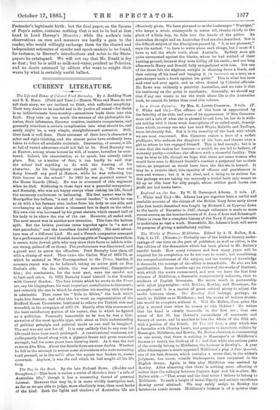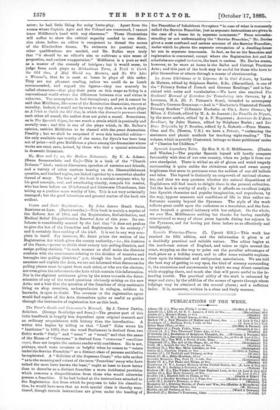The Works of Thomas Middleton,. Edited by A. H. Bullen,
B.A. Vols. I. to IV. (Nimmo.)—Probably one of the boldest literary under- takings of our time on the part of publisher, as well as editor, is the fine edition of the dramatists which has been placed in Mr. Bullen's careful hands. How many volumes and bow many years will be required for its completion we do not care to count ; but considering the comprehensiveness of the subject, and the variety of knowledge it demands, the courage of the editor is remarkable. So also are his qualifications. Some months ago we reviewed the works of Marlowe, with which the series commenced, and now we have the first fear volumes of Middleton, a dramatist comparatively unknown, even to students of English literature. He wrote much in partnership with other playwrights—with Dekker, Rowley, and Messinger, for example—and it is a matter of great critical nicety to adjust the credit between them. The Roaring Girl belongs, perhaps, as much to Dekker as to Middleton ; and the works of neither drama- tist would be complete without it. Will Mr. Bullen, then, print the play a second time when be comes to edit Dekker ? He writes that his hand is clearly traceable in the first act ; that one scene of Act II. has Dekker's naturalness of sentiment and fluency of metre, and he ascribes to him the whole of the fifth act, with a portion of the fourth. Of The Old Law, a play which was a favourite with Charles Lamb, and purports to have been written by Messinger, Middleton, and Howley, Mr. Bullen observes, in commenting on one scene, that there is nothing in Massinger's or Middleton's dramas to match the drollery of it ; and that while the serious parts of the comedy belong to Middleton, the humour is Rowley's. A year after Shakespeare's death appeared Middleton's play A Fair Quarrel, one of his beat dramas, which contains a scene that, in the editor's judgment, has never, outside Shakespeare, been surpassed in the English drama. Again, in this play Middleton was assisted by Rowley. After observing that there is nothing more affecting or nobler than the colloquy between Captain Ager and his mother, Mr. Bullen adds .—" That scene and the duel scene I believe to belong to Middleton. To such a height of moral dignity and artistic excellence Rowley never attained. We may safely assign to Rowley the boisterous comic scenes. Middleton's humour is of a quieter char- acter ; he had little liking for noisy horse-play. Apart from the scenes where Captain Ager and the Colonel are concerned, I cannot trace Middieton's hand with any clearness." These illustrations will suffice to show the critical sagacity needed in one direc- tion alone, before an editor is competent to thread the mazes of the Elizabethan drama. To estimate its poetical worth, other qualifications are needed, and Mr. Bullen says truly that "it should be an editor's aim to cultivate a nice sense of proportion, and eschew exaggeration." -Middleton is a poet as well as a master of the comedy of intrigue ; but it would seem, to judge from such plays as Michaelmas Term, A Trick to Catch the Old One, A Mad World my Masters, and No Wit Like a Woman's, that he is most at home in plays of this order. They are not pleasant reading, unless we could do as Lamb recommended, and regard the figures—they can scarcely be called characters—that play their parts on this stage as living in a conventional world where the difference between vice and virtue is unknown. The atmosphere is foal throughout ; and yet it cannot be said that Middleton, like some of the Restoration dramatists, sneers at morality. Indeed, it would not be true to say that, even in such plays as A Trick to Catch the Old One, in which the dramatis persona cheat each other all round, the author does not point a moral. Sometimes, as in The Spanish Gipsy, he can reach a strain which is poetically and morally true ; and this is one of the plays which, in Mr. Bullen's opinion, entitles Middleton to be classed with the great dramatists. Possibly ; but we shall be surprised if even this beautiful edition— the only available one worthy of the name, for Dyce's has been long out of print—will give Middleton a place among the dramatists whose works are read, save, indeed, by those who find a special attraction in dramatic literature.



































 Previous page
Previous page